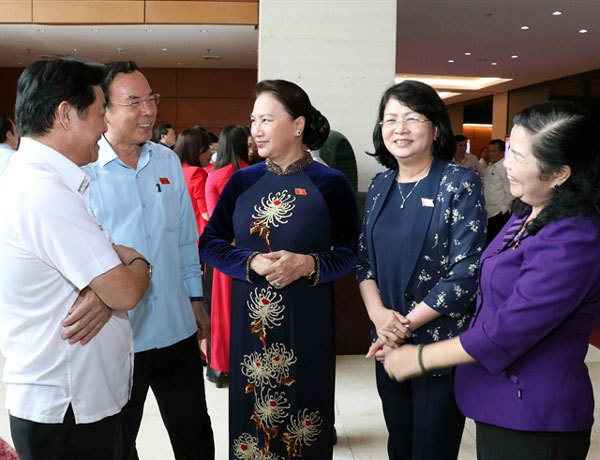Rate of women parliamentarians in VN higher than global average
Students talk gender equality at Hanoi dialogue
 |
| NA Chairwoman Nguyen Thi Kim Ngan (centre) and Vice President Dang Thi Ngoc Thinh (second right) with deputies during the seventh session of the 14th NA. – VNA/VNS Photo Van Diep |
These were among the main conclusions of a study of the implementation of the Law on Gender Equality in the last 10 years by the Centre for Education Promotion and Empowerment of Women (CEPEW), which was released by Ngo Thi Thu Ha, its deputy director, on Thursday.
The centre polled more than 900 people in the four provinces of Ha Giang, Ha Nam, Binh Thuan, and Tra Vinh to evaluate the impact of the law, which took effect in 2007, on the country’s political landscape.
Over three terms, from 2005-10 to 2015-20, the percentage of women members of the National Assembly rose slightly from 25.8 to 26.5 per cent.
The NA also has its first chairwoman now.
The 2015 Law on Election of Deputies to National Assembly and Deputies to People’s Councils stipulates a minimum of 35 per cent women candidates to be nominated for NA elections.
It has ushered in greater gender equality in politics, especially at the provincial level, though few women have achieved high positions.
A commune-level woman leader of the Viet Nam Fatherland Front in Tra Vinh Province, who asked not to be named, said: “People’s awareness of gender equality has changed. Women are not restricted from taking part in political activities, they are even encouraged to join capacity building courses.”
The study found that more than 79 per cent of male voters and 69 per cent of female voters said they supported women candidates.
But gender prejudices and the difference in retirement ages for men and women still pose challenges to women in politics.
“Therefore, it is essential to increase the rate of women nominated as NA candidates to higher than 35 per cent, make the retirement age common for both men and women and promote the role of social organisations in accelerating gender equality,” Ha said.
Hoang Thi Kim Que, a former head of the law faculty at the Viet Nam National University – Ha Noi, said the study only touched upon the number of women in politics.
“This makes it impossible to assess how women benefit from such changes. In future studies I hope we will be able to study how women take part in the policy-making process and how it impacts the community.”
VNS
 Although the number of women in politics continues to rise, the ratio of women in high positions remains low." itemprop="description" />
Although the number of women in politics continues to rise, the ratio of women in high positions remains low." itemprop="description" />